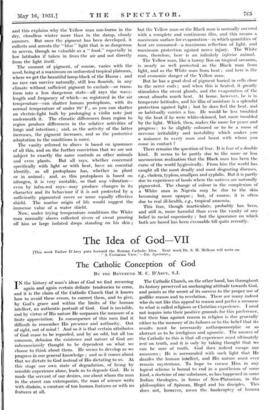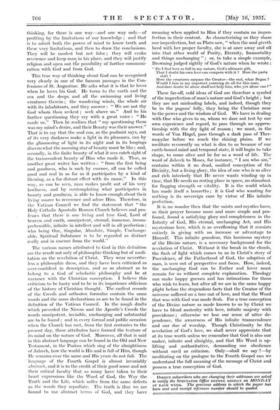The Idea of God VII
(This week Father D'Arcy puts forward the Roman Catholic Idea. Next week Dr. S. H. Mellone will write on " A Unitarian View."—En. Spectator.j
The Catholic Conception of God BY THE REVEREND M. C. D'Ancr, S.J.
IN the history of man's ideas of God we find recurring again and again certain definite tendencies to error, and it is the claim of the Catholic Church that it knows how to avoid these errors, to correct them, and to give, by God's grace and within the limits of the human intellect, an authentic portrait of God. God is invisible, and by virtue of His nature He surpasses the measure of a finite appreciation. In consequence of this men find it difficult to remember His presence and authority. Out of sight, out of mind ! And so it is that certain attributes of God cease to be regarded, and by an odd, but all too common, delusion the existence and nature of God are subconseicaisly thought to be dependent on what we choose to think about them. He seems to develop as we progress in our general knowledge ; and so it comes about that we dictate to God instead of His dictating to us. At this stage our own state of degradation, of living by sensible experience alone, leads us to degrade God. He is made the servant of our desires, one about whom the man in the street can extemporize, the man of science write with disdain, a creature of too human features or with no features at all. The Catholic Church, on the other hand, has throughout its history preserved an unchanging attitude towards God, and points as the secret of its success to the proper use of godlike reason and to revelation. There are many indeed who do not like this appeal to reason and prefer a recourse to what is called religious or Christian experience. I need not inquire into their positive grounds for this preference, but their bias against reason in religion is due generally either to the memory of its failures or to the belief that its results must be necessarily anthropomorphic or so abstract as to be irreligious and agnostic. The answer of the Catholic to this is that all experience must ultimately rest on truth, and it is only by taking thought that we can be sure of truth. God does indeed escape our measures ; He is surrounded with such light that He dazzles the human intellect, and His nature must ever remain mysterious. To hope to encase Him in any logical scheme is bound to end in a pantheism of some kind, a doctrine of one substance, as has happened in some Indian theologies, in forms of Neo-Platonism, in the philosophies of Spinoza, Hegel and his disciples. This does not, however, mean the bankruptcy of human thinking, for there is one way—and one way only—of profiting by the limitations of our knowledge ; and that is to admit both the power of mind to know truth and these very limitations, and then to draw the conclusions. They will be modest but not false ; they will evoke reverence and keep man in his place, and they will justify religion and open out the possibility of further communi- cation with God and from God.
This true way of thinking about God can be recognized very clearly in one of the. famous passages in the Con- fessions of St. Augustine., He asks what it is that he loves when he loves his God. He turns to the earth and the sea and the deeps, and all the swimming and living creatures therein ; the wandering winds, the whole air with its inhabitants, and they answer : " We are not thy God whom thou seekest ; seek above us." And to his further questioning they cry with a great, voice : " He made us." Then he realizes that " my questioning them was my mind's desire, and their Beauty was their answer." That is to say that the soul can, as the psalmist says, out of its very darkness make a light in its pleasures, can by the glimmering of light in its night and in its longings discern what the morning star of beauty must be like; and, secondly, in the finite beauty of what it sees catch sight of the transcendent beauty of Him who made it. Thus, as another great writer has written : " from the first being and goodness, who is such by essence, all can be called good and real in so far as it participates by a kind of likening, as a far distant effect with its cause." In this way, as can be seen, man makes profit out of his very lowliness, and by contemplating what participates in beauty and goodness, is able to know enough about their living source to reverence and adore Him. Therefore, in the Vatican Council we find the statement that " the Holy Catholic Apostolic Roman Church believes and pro- fesses that there is one living and true God, Lord of heaven and earth, omnipotent, eternal, immense, incom- prehensible, infinite in intellect and will -in all perfection : who being One, Singular, Absolute, Simple, Unchange- able, Spiritual Substance is to be regarded as distinct really and in essence from the world."
The various names attributed to God in this definition are the result not only of philosophic thinking but of medi- tation on the revelation of Christ. They wear neverthe- less a philosophic dress, and they have been criticized as over-confident in description,- and as so abstract as to belong to a God of scholastic philosophy and be at variance with the Christian conception. I believe this criticism to be hasty and to be in its impatience oblivious of the history of Christian thought. *The:earliest records of the Creeds and orthodox formulae contain the same words and the same declarations as are to be found in the definition of the Vatican Council. In' the rough drafts • which preceded the Nicene and the ApoStle's Creeds the words omnipotent, invisible, unchanging and substantial are to be found ; and in every formal and public occasion when the Church has met, from the first centuries to the present day, these attributes have formed the texture of its mind on the nature of God. Moreover; all that is said in this abstract language can be found in the Old and New Testament, in the Psalms which sing of the almightiness of Jahveh, how the world is His and is full of Him, though He remains ever the same and His yearS do not fail. The language of the Fourth Gospel is almost invariably abstract, and it is to the credit of their good sense and not their critical faculty that so many have taken. to their heart expressions like. the Word of God,- the Way the Truth and the Life, which suffer from the- same defects as the words theY repudiate. The. truth is .that we are bound to use abstract terms of God, and they have meaning when applied to Him if they contain no imper- fection in their content. As characterizing us they share our imperfection, but as Plato saw, " when the soul giveth heed with her proper faculty, she is at once away and off into that other - world of Purity, Eternity, Immortality and things unchanging " ; or, to take a simple example, Browning judged rightly of God's nature when he wrote ;
" Do I find love so full in my nature, God's ultimate gift, That I doubt his own love can compete with it ? Here the parts shift ?
Here the creatures surpass the Creator—the end, what Began ? Would I fain in my impotent yearning do all for this man, And dare doubt he alone shall not help him, who yet alone can ?"
These far-off, cold ideas of God are therefore a symbol of the imperfection of man's nature and God's height ; but they are not misleading labels, and indeed, though they be to the pagans' folly, they bring the Christian near to the power and the wisdom of God. We have in dealing with One who gives to us, whom we dare not test by our own experience and regard, to pass through an appren- ticeship with the dry light of reason ; we must, in the words of Von Hugel, pass through a dark pass of Ther- mopylae before we reach the shining plains. If we meditate reverently on what is dim to us because of our earth-bound mind and temporal state, it will begin to take shape, to come alive and be for us a word of life. The word of Jahveh to Moses, for instance, " I am who am," contains within it no dead, ossified conception of the Divinity, but a living glory, the idea of one who is so alive and rich interiorly that He never wants winding up in time, that He needs no resting place in space, no stimulant for flagging strength or vitality. It is the world which has made itself a lazaretto ; it is God who wanting for nothing is its sovereign cure by virtue of His infinite perfection.
It is no wonder then that the saints and mystics have, as their prayer became more and more simple and pro- found, found a satisfying glory and completeness in the Infinity of God, His eternal, unchanging Act, and His mysterious love, which is so overflowing that it consists entirely in giving with no increase or advantage to Himself. This infinite grandeur, this luminous mystery of the Divine nature, is a necessary background for the revelation of Christ. Without it the break in the clouds, the flash of light which comes to us in Christ's story of Providence, of the Fatherhood of God, the adoption of man, is seen out of perspective and focus. How, indeed, the unchanging God can be Father and lover must remain for us without complete explanation. Theology can make happy guesses and has intimations for those who wish to learn, but after all we are in the same happy plight before the stupendous facts that the Creator of the universe suffered on a tree out of love, and that the Word that was with God was made flesh. For a true conception of the Divine nature as made known to us by Christ we have to blend austerity with love, infinite majesty with providence ; otherwise we lose our sense of utter de- pendence, the awareness of His infinite transcendence and our due of worship. Though Christianity be the revelation of God's love, we shall never appreciate that at its true worth unless we remember that God is also our maker, infinite and almighty, and that His Word is up- lifting and authoritative, demanding our obedience without cavil or criticism. Only—shall we say ?—by meditating on the prologue to the Fourth Gospel can we understand the full meaning of the message of Christ and possess a true conception of God.



















































 Previous page
Previous page